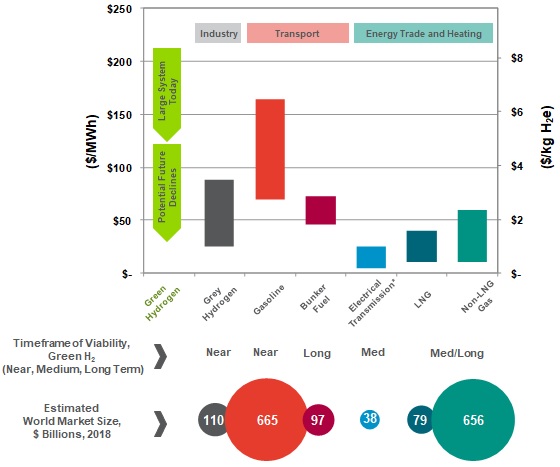- Hydrogen
- Hydrogen Economy
- Hydrogen Storage
- Hydrogen Economy Technologies
Promising Hydrogen Startups All Have the Same Goal

The hydrogen economy has progressed for the past few decades without dramatic success. Will a new wave of investment bear fruit? Some startups think they have the key: technologies to generate cheap, clean hydrogen. While significant investments are being made across the hydrogen value chain, startups may play an industry-pivoting role as they developing new ways to generate hydrogen.
Seeking Cheap Hydrogen
The elusive goal has been to generate green hydrogen cheaply. The cost of industrial hydrogen, currently made from fossil fuels in the $1/kg-$2/kg range at large scale, is the approximate goal (a bit higher is okay, thanks to monetizable discounts for avoiding costs like transportation and carbon emissions). On an energy basis, this equates to around $25/MWh to $50/MWh. Cheap hydrogen offers myriad options, including high value industrial and transportation uses and lower value uses like the provision of dispatchable power or heat through fuel cells, turbines, boilers, or furnaces. The following figure considers applications where hydrogen might be used, with further context provided in Guidehouse Insights' report, Emerging Cross-Sector Opportunities in the Hydrogen Economy.
Cost of Energy and Market Size, Selected Markets: 2018

*High voltage electrical transmission for renewables integration.
(Source: Guidehouse Insights)
Startups Are Gaining Investment Traction
Hydrogen activity has increased recently, with new groups like the Hydrogen Council, an uptick in M&A activity, and general interest in hydrogen as renewable electricity gets cheaper and pressure grows to decarbonize. Startups have been touting new ways of generating hydrogen, with some activity outlined below:
- Nel Hydrogen, as I’ve covered previously, is not a startup but an established leader in water electrolysis that partly hitched its star to a startup with $14 billion of commitments from customers, Nikola Motor. Nel’s successful execution of the huge Nikola contract, consisting of up to 1 GW of 20 MW systems for fueling stations, will be crucial for scaling up manufacturing and proving the case for electrolysis industry-wide. Nikola has said hydrogen at the stations would be made publicly available for $3.50/kg. Traditional water electrolysis, though still emerging commercially, is more advanced than other technologies outlined.
- Joi Scientific has a technology that generates hydrogen from seawater. Like many peers, it shares little info on its product. Patent filings mention a pulsed DC driver signal to generate an excitation signal on subject material, presumably seawater, inside a hydrogen generation chamber. Under a contract worth at least $10 million, the company is working with Canadian utility NB Power to develop the world’s first hydrogen-powered distributed electricity grid. NB Power saw the prospect of a scaled-up facility producing at a levelized cost of $0.05/kWh to $0.08/kWh, which on energy terms is close to $2.00/kg of hydrogen at the lower end.
- Trolysis uses the chemical energy of waste aluminum to generate hydrogen, with the only byproduct being alumina, a commodity. The company is building a pilot system and claims to be able to generate hydrogen for as cheaply as $2.00/kg to $2.50/kg.
- Hypersolar’s second generation system is under development and employs nanoparticles structured as autonomous nano-solar cells with catalysts, with billions such cells within a square centimeter of protective layer. The company targets <$4.00/kg hydrogen production with the upcoming technology.
Is the Hydrogen Revolution Coming?
These companies and others have the potential to revolutionize the energy industry if a breakthrough can be scaled up. Most companies make sure to mention this on their websites. They tend not to give away much info to preserve competitive advantage, perhaps justifiably. However, as investors and potential partners become ever savvier there will be no place to hide for inefficient technologies. Those that can prove a breakthrough will be sought after for acquisition and have a world of growth opportunities ahead.